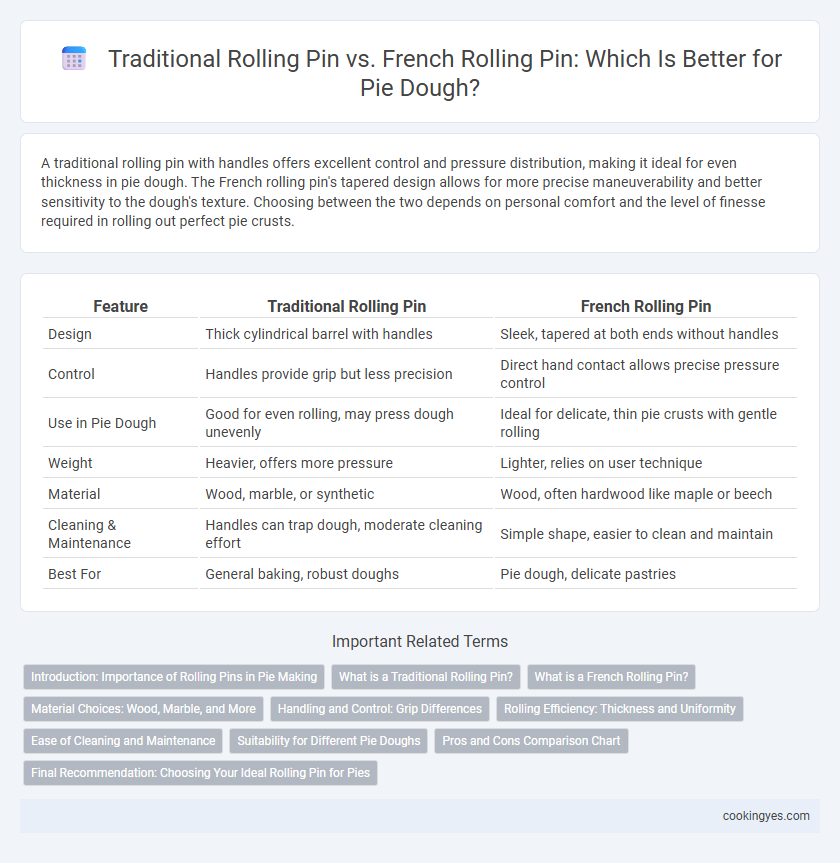A traditional rolling pin with handles offers excellent control and pressure distribution, making it ideal for even thickness in pie dough. The French rolling pin's tapered design allows for more precise maneuverability and better sensitivity to the dough's texture. Choosing between the two depends on personal comfort and the level of finesse required in rolling out perfect pie crusts.
Table of Comparison
| Feature | Traditional Rolling Pin | French Rolling Pin |
|---|---|---|
| Design | Thick cylindrical barrel with handles | Sleek, tapered at both ends without handles |
| Control | Handles provide grip but less precision | Direct hand contact allows precise pressure control |
| Use in Pie Dough | Good for even rolling, may press dough unevenly | Ideal for delicate, thin pie crusts with gentle rolling |
| Weight | Heavier, offers more pressure | Lighter, relies on user technique |
| Material | Wood, marble, or synthetic | Wood, often hardwood like maple or beech |
| Cleaning & Maintenance | Handles can trap dough, moderate cleaning effort | Simple shape, easier to clean and maintain |
| Best For | General baking, robust doughs | Pie dough, delicate pastries |
Introduction: Importance of Rolling Pins in Pie Making
Choosing the right rolling pin is crucial for achieving the perfect pie dough texture and thickness. Traditional rolling pins, often heavier and thicker, provide consistent pressure ideal for evenly rolling out stiff doughs, while French rolling pins offer a slimmer, tapered design that allows for greater control and finesse in shaping delicate pastry. Understanding these differences can significantly enhance precision and overall pie quality during preparation.
What is a Traditional Rolling Pin?
A traditional rolling pin is a cylindrical wooden tool with handles on both ends, commonly used for rolling out pie dough evenly and smoothly. Its sturdy structure provides firm control and consistent pressure, ideal for achieving uniform thickness in pastry preparation. Unlike the tapered French rolling pin, the traditional style offers more leverage and is often preferred for heavy-duty doughs.
What is a French Rolling Pin?
A French rolling pin is a tapered wooden tool without handles, designed to provide better control and sensitivity when rolling out pie dough. Its uniform, cylindrical shape allows for even pressure, making it easier to achieve thin, consistent crusts compared to traditional rolling pins with handles. This design enables bakers to feel the dough's texture and thickness, resulting in superior pie crust quality.
Material Choices: Wood, Marble, and More
Traditional rolling pins, typically made from hardwood like maple or beech, offer durability and a natural non-stick surface ideal for pie dough. French rolling pins are often crafted from hardwood or stainless steel, providing a smooth, tapered design that enhances control and precision. Marble rolling pins remain popular for their cool temperature retention, preventing dough from sticking and helping maintain the ideal texture during pie preparation.
Handling and Control: Grip Differences
Traditional rolling pins feature handles that provide a firm grip, allowing consistent pressure and easy control when rolling pie dough, especially beneficial for beginners. French rolling pins, lacking handles, offer a more tactile connection to the dough, giving experienced bakers enhanced sensitivity and precision during rolling. The choice between the two impacts dough thickness control and ease of maneuverability, influencing the final pie crust texture and uniformity.
Rolling Efficiency: Thickness and Uniformity
Traditional rolling pins with handles offer stable pressure distribution, but French rolling pins provide superior control for achieving even thickness and uniformity in pie dough. The tapered design of French rolling pins allows for precise adjustments, reducing the risk of over-rolling and uneven edges. This results in consistently smooth dough, essential for flawless pie crust texture and appearance.
Ease of Cleaning and Maintenance
Traditional rolling pins often feature handles that trap dough and flour, making them more challenging to clean thoroughly. French rolling pins, with their seamless, tapered design, facilitate easier cleaning and reduced dough buildup. The smooth surface of French rolling pins requires less maintenance, promoting better hygiene for pie dough preparation.
Suitability for Different Pie Doughs
Traditional rolling pins, typically thicker with handles, provide better leverage for rolling out tougher pie doughs like all-butter or lard-based crusts, ensuring even pressure and control. French rolling pins, slender and without handles, offer enhanced sensitivity, making them ideal for delicate doughs such as pate sucree or flaky pie crusts that require gentle handling to maintain texture. Choosing between these rolling pins depends on the dough's gluten development and desired flakiness, with traditional pins suited for sturdier doughs and French pins optimized for fragile, buttery pastries.
Pros and Cons Comparison Chart
Traditional rolling pins offer a sturdy, thick design ideal for even pressure distribution on pie dough, but their heavier weight may cause fatigue during prolonged use. French rolling pins, characterized by a tapered, cylindrical shape without handles, provide greater control and sensitivity to dough thickness, though they may require more practice to master consistent pressure. Choosing between the two depends on user preference for control versus stability, with traditional pins benefiting heavier, denser doughs and French pins excelling in delicate, precise rolling tasks.
Final Recommendation: Choosing Your Ideal Rolling Pin for Pies
Traditional rolling pins, often thicker with handles, provide stability and leverage, making them ideal for beginners preparing pie dough. French rolling pins, tapered and handle-free, offer superior control and sensitivity, allowing experienced bakers to roll dough evenly and with finesse. For pie enthusiasts seeking precision and finesse in dough thickness, the French rolling pin is recommended, while traditional rolling pins suit those valuing ease and control.
Traditional rolling pin vs French rolling pin for pie dough Infographic

 cookingyes.com
cookingyes.com